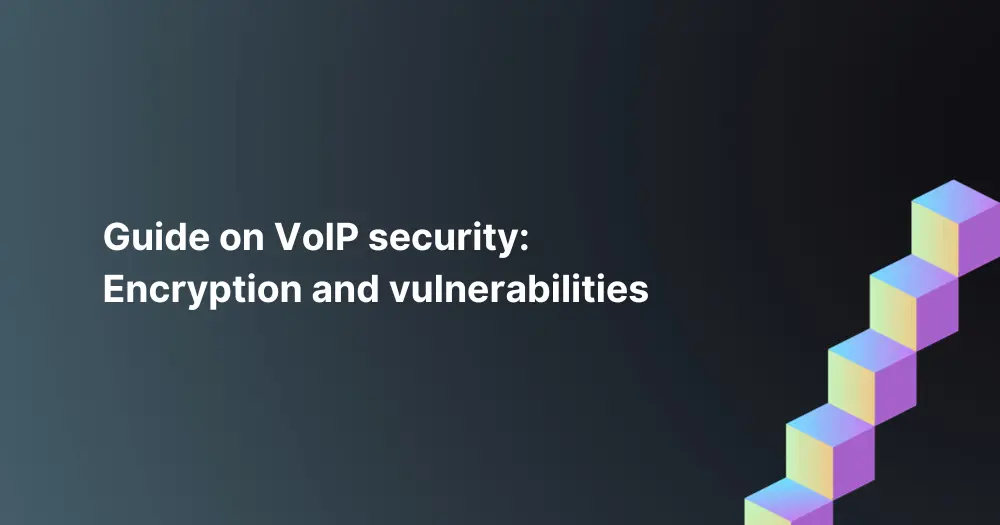
VoIP plays a crucial role in enhancing operational efficiency. However, its growing importance necessitates robust security measures. Businesses should prioritize encryption, firewalls, access controls, monitoring, employee training, vendor assessments, contingency planning, and penetration testing. This integrated approach ensures data protection and business resilience, particularly for small enterprises relying on VoIP’s cost-efficiency and flexibility.
VoIP security is vital for preserving the confidentiality of business conversations and protecting sensitive data. Inadequate safeguards can lead to interception and compromise. Business owners must grasp these threats for optimal success.
Evolving Threat Landscape: The landscape of threats within the VoIP realm is constantly in flux. Cybercriminals employ various techniques, including eavesdropping, call interception, and service disruption. Eavesdropping enables malicious parties to eavesdrop on conversations, potentially gaining access to confidential information. Interception can divert calls to unauthorized entities, while service disruption can disrupt your communication network.
VoIP vs. Conventional Telephony: VoIP provides numerous benefits, such as cost savings and scalability, compared to traditional telephony. However, these advantages also introduce distinct security considerations. Unlike conventional phone systems, VoIP data traverses the internet, rendering it more susceptible to security risks.
Encryption in Voice over Internet Protocol (VoIP) entails the utilization of cryptographic algorithms to augment data security. The audio data transforms upon initiating a VoIP call, rendering it resistant to unauthorized comprehension without the requisite decryption key.
Transport Layer Security (TLS): This discourse centers on the pivotal function of TLS in the encryption of signaling data within the context of Voice over Internet Protocol (VoIP) calls. TLS is critical in establishing a secure foundation for the initial connection between communicating devices, guaranteeing the communication setup’s integrity and confidentiality. This safeguard is paramount in mitigating the risks of eavesdropping and call interception during the call setup phase.
Secure Real-time Transport Protocol (SRTP): Within this discussion, we shall delve into the intricate mechanisms by which SRTP is employed to fortify the confidentiality and integrity of voice data during VoIP calls. SRTP stands as a linchpin, assuring that the voice data exchanged during these conversations remains immune to compromise or unauthorized alteration, thereby upholding the privacy and trustworthiness of these interactions.
Despite the implementation of robust security measures, it is imperative to recognize that vulnerabilities and potential threats persist within VoIP systems.
Social Engineering and Phishing: Examine how malevolent actors use social engineering techniques to access VoIP systems illicitly. Phishing attacks involve manipulating individuals into divulging their credentials, enabling attackers to compromise VoIP accounts and clandestinely monitor calls.
Maintaining VoIP system security is an ongoing imperative, encompassing a multifaceted array of best practices to mitigate potential risks.
Robust Authentication Protocols
Emphasize the criticality of employing intricate and distinct passwords for VoIP accounts and associated devices. Advocating periodic password updates and implementing multi-factor authentication is integral to overall security.
System Vigilance through Regular Updates and Patching
Encourage proprietors of small businesses to perpetually maintain their VoIP systems with the latest updates and patches to fortify the system against identified vulnerabilities. These regular updates and patches serve as strong defenses, ameliorating known security susceptibilities and bolstering system resilience.
The Defensible Perimeter: Firewall and Intrusion Detection Systems (IDS)
Articulate the indispensable roles of firewalls and intrusion detection systems in identifying and mitigating security threats. Firewalls operate as formidable barriers, demarcating and safeguarding the VoIP network from potential menaces, while intrusion detection systems provide continual scrutiny to discern and counteract any suspicious activities.
Sustaining Employee Competence
Highlight the unceasing necessity for recurrent security training to empower employees with the capability to recognize and address potential threats. Informed and vigilant employees constitute an integral facet of your overarching security strategy.
Prudent Selection of VoIP Service Providers
Expound upon the significance of VoIP service providers in safeguarding VoIP systems and delineate the criteria that small business proprietors should consider when selecting a provider. The judicious choice of a reputable service provider committed to robust security measures and the ongoing integrity of your VoIP network is paramount.
The advantages inherent in implementing robust security measures for your VoIP system extend well beyond the fundamental safeguarding of data.
Ready to safeguard your business communications and protect sensitive data? At BlackPoint IT Services, we specialize in VoIP security, offering robust authentication protocols, regular updates, firewall and intrusion detection systems, employee training, and guidance in selecting secure service providers. Trust us to fortify your VoIP systems, ensuring data protection, business continuity, regulatory compliance, and reputation maintenance. Contact us now for a more secure and resilient VoIP setup crucial for your business’s success.